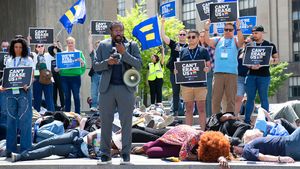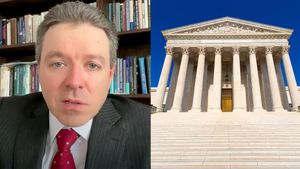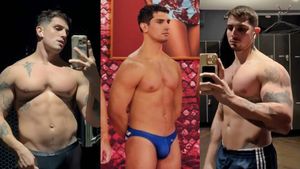On June 24th, 2022, the Supreme Court of the United States overturned Roe v. Wade in its decision on Dobbs v. Jackson, ending the constitutional right to an abortion. The court's decision diminished women's equality in the United States. Those in favor of limiting abortion argued that the Supreme Court only opened the door for the states to regulate the issue according to their constitutions.
It is not women who are to benefit from this decision. In families like the one I grew up in, with a single mother, the men took off and didn't provide child support for me or my younger brother. President Trump's appointees to the Supreme Court were critical to the decision on Dobbs v. Jackson. After this court decision, many people began to ask what other rights would be stripped away next.
Then, the following year, the decisions came one after another.
On June 29th, 2023, the Supreme Court reversed prior decisions in Students for Fair Admissions, Inc. v. President and Fellows of Harvard College. It ruled that race-conscious admissions programs are unlawful. The news articles on the court decision pointed out that this was in the making. However, this decision impacts the racial and ethnic composition of students entering and graduating from elite colleges and universities. As a Latinx man who earned a PhD, I can't help but ask myself how the lack of affirmative action would have impacted my access to higher education. The end of affirmative action means that minorities have less access to elite colleges and universities. By having fewer people of color at elite colleges and universities, the Supreme Court is making a decision that will impact the future composition of the ruling class.
 TK CAPTION - (trim from Getty) Harvard Affirmative Action Protest Cambridge, MA seen A Harvard student holds a sign during a rally protesting the Supreme Courts ruling against affirmative action.Craig F. Walker/The Boston Globe via Getty Images
TK CAPTION - (trim from Getty) Harvard Affirmative Action Protest Cambridge, MA seen A Harvard student holds a sign during a rally protesting the Supreme Courts ruling against affirmative action.Craig F. Walker/The Boston Globe via Getty Images
As a professor at a community college, I also wonder how this decision will be received by young people looking to apply to college. This will impact my students, the majority of whom are Black, Latinx, and immigrants, as they continue their studies and seek to transfer to a senior college. As immigrants and racial and ethnic minorities, they will have fewer opportunities to achieve their version of the American dream.
On June 30, 2023, in Creative LLC et al. v. Elenis et al., the Supreme Court ruled that a web designer can refuse to design a wedding website for a same-sex couple because it conflicts with the designer's religious beliefs. This ruling made same-sex couples less equal before the law and in the eyes of the public. Businesses can now use religion as a reason to discriminate against people like my husband and me. the use of religion to discriminate against LGBTQ+ individuals isn't anything new, and it isn't going away anytime soon. The court's decision makes my husband and me less equal before the law as a gay couple.
On June 30th, 2023, the Supreme Court also ruled against President Biden's student loan debt relief in Biden, President of the United States, et al. v. Nebraska et al. The court struck down a program that would have forgiven up to $20,000 in federal student loans for those who had received Pell Grants from the federal government as undergraduate students. That's people like my husband, me, and many of my friends. We received Pell Grants from the federal government as undergraduate students, completed our undergraduate education, and became professionals, part of the middle class. If there was ever any doubt about whether class struggle was real, the decision, in this case, answered that question resoundingly. Again, the court's ruling favors one class of people: those who can afford to pay for college for their children, either with their savings or out of pocket.
The Supreme Court's decisions have benefited people who aren't women, people who don't have to take out student loans, people who aren't same-sex couples, and people who aren't people of color.
Since the beginning of the Trump administration, we have been regressing rather than progressing as a society. Those who asked themselves what other rights, freedoms, and opportunities the Supreme Court would strip away after the demise of Roe v. Wade were right to do so. In these past few years, we have seen the answers to those questions.
 The justice of the U.S. Supreme Court
Fred Schilling, Collection of the Supreme Court of the United States
The justice of the U.S. Supreme Court
Fred Schilling, Collection of the Supreme Court of the United States
To live in the United States during Trump's second term means to live under a white-supremacist and fascist government that wages a daily war on DEI, communities of color, sexual and gender minorities, immigrants, and non-English speakers. Attacks on people who are poor and working class, people who aspire to get an education, become working professionals, and buy a home. We're subjected to policies that work against us and are meant to keep us down.
The Supreme Court decisions of previous years were a preamble to Trump's second term and a fascist government.
Luis Guzmán Valerio was born in the Dominican Republic and lives in New York with his husband. He holds a Ph.D. in Latin American, Iberian, and Latino Cultures and teaches Spanish at LaGuardia Community College. His creative writing has appeared in Latino Book Review Magazine and Chiricú Journal.
Voices is dedicated to featuring a wide range of inspiring personal stories and impactful opinions from the LGBTQ+ and Allied community. Visit Advocate.com/submit to learn more about submission guidelines. We welcome your thoughts and feedback on any of our stories. Email us at [email protected]. Views expressed in Voices stories are those of the guest writers, columnists and editors, and do not directly represent the views of The Advocate or our parent company, equalpride.


 TK CAPTION - (trim from Getty) Harvard Affirmative Action Protest Cambridge, MA seen A Harvard student holds a sign during a rally protesting the Supreme Courts ruling against affirmative action.Craig F. Walker/The Boston Globe via Getty Images
TK CAPTION - (trim from Getty) Harvard Affirmative Action Protest Cambridge, MA seen A Harvard student holds a sign during a rally protesting the Supreme Courts ruling against affirmative action.Craig F. Walker/The Boston Globe via Getty Images The justice of the U.S. Supreme Court
Fred Schilling, Collection of the Supreme Court of the United States
The justice of the U.S. Supreme Court
Fred Schilling, Collection of the Supreme Court of the United States











































































